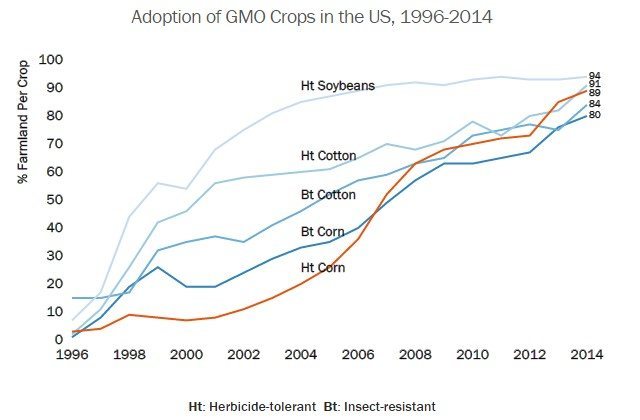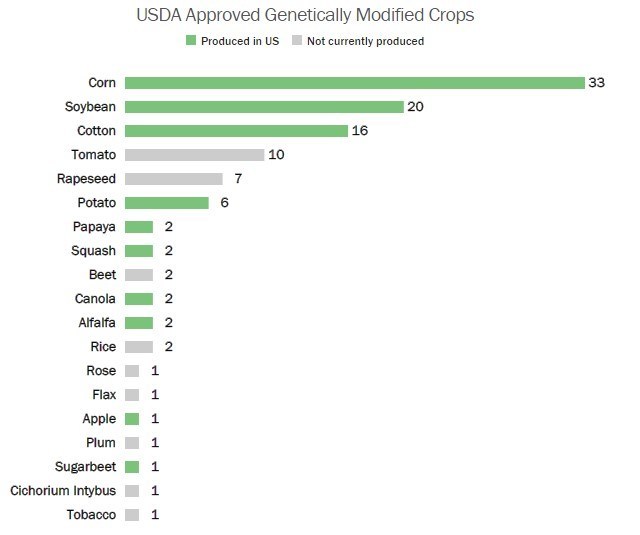A few days ago, Chipotle announced that its restaurants won’t serve food that includes genetically modified organisms (GMO). This is a huge step forward to labeling this kind of food. There is no obligation for food manufacturers and sellers to indicate that their products contain GMO ingredients. In addition, there is no requirement for biotech companies to provide details about the GMO seeds used in the process of production.
But, even without this information, we are all well-aware that GMOs are used in many foods. It is completely legal to use GMOs. Ever since they were approved in 1996 their use is increasing rapidly every year. For example, about 90% of soybean corn, and cotton acreage in the United States are used for growing genetically modified crops.
Few other food crops that are really popular are beets, sugar beets, summer squash, papaya, and canola. In addition, the FDA approved the production of bruise-free potatoes and apples that don’t brown too.
READ ALSO: 37 Million Bees Found Dead After Planting Large GMO Corn Field
Source: TIME
It is a good idea to take a closer look at all the permits issued by the Food and Drug Administration (FDA) and the United States Department of Agriculture (USDA) – GMO foods monitors, along with the Environmental Protection Agency. Keep in mind that not all of these permits are for commercially approved crops.
In order to produce crops for commercial purposes, biotechnology companies need to get deregulated status – approval from the USDA to plant, grow, and distribute GMO products without any limits.
The bar chart found below provides us a clear view of all deregulated crops. They are listed by the number of genetic varieties approved for each crop. Those crops marked with green color (a total of 10 crops) are produced and used in the United States. You can find more information on the list.
Source: USDA Animal and Plant Health Inspection Service
GMO Foods People in the U.S. Already Consume
1. Corn
There are many products on the US market which include genetically modified corn. This crop is used in the process of production of many different ingredients found in processed drinks and foods like corn starch and high-fructose corn syrup for example. However, the vast majority of this GM corn produced around the globe is given to livestock. A small part of it is used in biofuels.
2. Soybeans
This is the second-largest crop in the United States after corn. GM soybeans are used in livestock feed and in the production of soybean oil. This oil is used in almost all restaurant chains and in processed food. About 60% of vegetable oil consumption in the United States includes soybean oil. In addition, this crop is also used to create soy lecithin, an emulsifier that can be found in a huge number of processed foods like candy and dark chocolate bars.
3. Cotton
A large quantity of genetically modified cotton is used for the production of cottonseed oil. This oil is used in popular restaurants and in some food that we can find in every store like margarine, potato chips, cans of smoked oysters, etc. Several parts of this plant are used in livestock and animal feed and even the “waste” is turned into something useful – food fillers like cellulose.
4. Potatoes
This is a relatively newly approved GM crop. These potatoes are more resistant to bruising and they contain less acrylamide – a chemical that causes cancer which is present in potatoes when high heat is applied to them. It is still not used in the food supply, but experts believe that this is something that will happen very soon.
5. Papaya
The main advantage of this GM crop is that it can fight off the ringspot virus, a virus that often destroys these plants. Their commercial use started in the late 1990s and they are also known as Rainbow Papayas. It is interesting that they are mostly grown in Hawaii.
6. Squash
Summer squash and zucchini are present on the US market since the middle of the 1990s. GM squash covers about 25.000 acres of land according to some experts.
7. Canola
GM canola is mostly used for the production of margarine and oil for cooking. In addition, it is sometimes used in emulsifiers found in packaged food. According to some statistics, about 90% of canola in Canada and the US is genetically modified.
8. Alfalfa
The decision to approve the commercial use of genetically modified alfalfa made by the FDA in 2011 was one of the most controversial decisions related to GMOs. This GM crop includes a gene that turns alfalfa into an herbicide-resistant plant. In most cases, GM alfalfa is used as hay for livestock/cattle.
9. Apples
This is another relatively new crop. It is produced by a Canadian biotechnology company and what makes it different than natural apples is that they don’t turn brown once they are sliced. It was approved by the FDA not a while ago. According to the FDA, this fruit is safe to consume. We will soon see these apples in the stores.
10. Sugar beets
More than 50% of granulated sugar found in the United States originates from genetically modified sugar beets, which have been used for more than 7 years. It is worth mentioning that their production was halted briefly due to certain safety-related concerns, they are produced without any halts since 2001.
Take a closer look at the charts of all the varieties of GMO foods mentioned before here.


